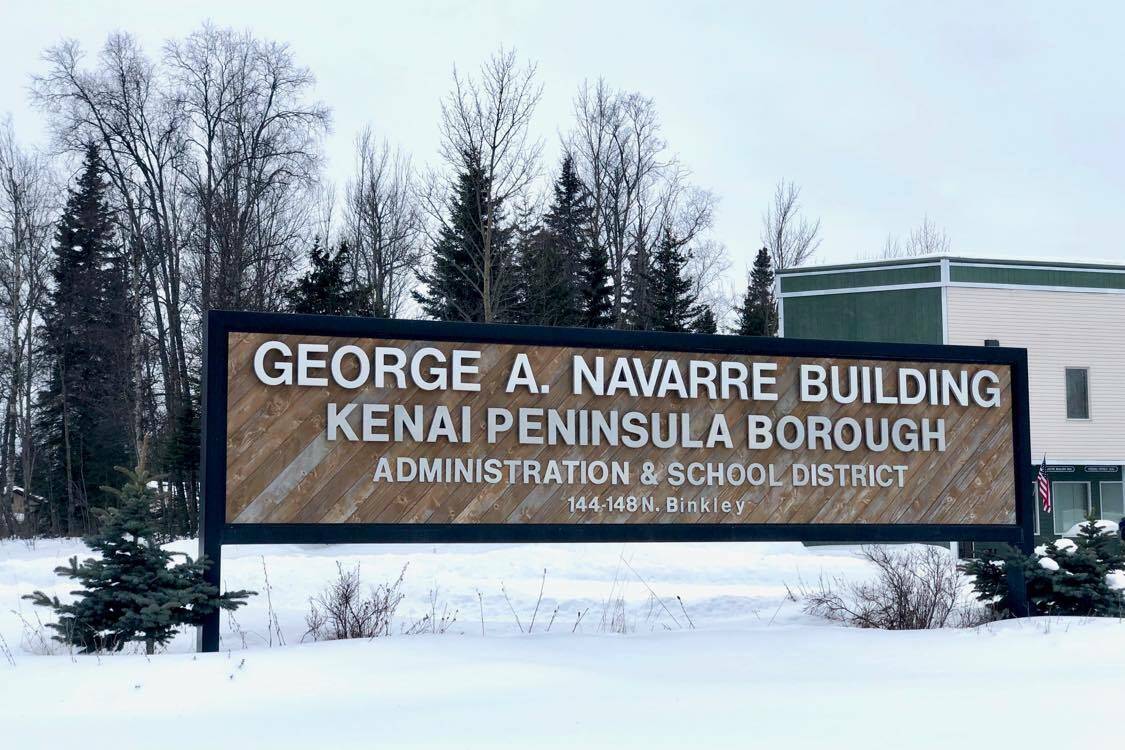A new Kenai Peninsula Borough policy that explains what is and isn’t allowed in borough buildings when it comes to photography, filming or recording became effective Monday.
The policy was created at the direction of Borough Mayor Peter Micciche in response to a “First Amendment Audit” incident that the borough experienced last year. During that incident, law enforcement responded to the borough’s administration building in Soldotna after a person was filming employees. The policy applies to all borough facilities except for those occupied or used by the Kenai Peninsula Borough School District.
In a Dec. 29, 2023, memo to borough employees, the Kenai Peninsula Borough Legal Department defined a “First Amendment Audit” as a situation in which a member of the public tests a government’s response to determine if the government is protecting the person’s First Amendment rights.
The same memo emphasizes that members of the public are allowed to film and take pictures inside borough facilities but may not harass borough employees or otherwise disrupt the ability of the borough to conduct day-to-day operations. It says that contacting law enforcement during a “First Amendment Audit” may “unnecessarily escalate” but should be done if an employee or another individual is threatened.
Under the policy, borough representatives — including the borough mayor, full- and part-time employees and volunteers — may not “impede, interfere with, attempt to stop, or seek to remove” people from public areas of borough buildings just because they are filming and refuse to identify themselves.
“Public areas” are those spaces in borough facilities that are open and accessible to the public during business hours or scheduled public meetings. They differ from areas accessible exclusively to borough employees — “Employees Only” — and from areas that may only be accessed by nonemployees who have an appointment.
Under the First Amendment to the United States Constitution, the policy says, people have the right to photograph, film or record in areas accessible to the public, even if they do not identify themselves.
“The KPB will respect this expression of free speech and so long as the individual is otherwise acting lawfully, and as such is not threatening or abusive toward KPB employees, the individual’s attempt to film areas accessible to the public will not be interfered with,” the policy says.
Employees who encounter an individual who is filming in a public space, the policy says, should be polite and professional, stay calm and turn over or cover any confidential, private or sensitive information. Then, the policy says employees may either remove themselves from the situation, manage the situation or do a combination of both.
Employees who are physically or verbally threatened, or who witness illegal activity, are instructed to call the police.
The policy also outlines new “Rules of Conduct” applicable to all areas of borough facilities. Those rules, which the policy says will be posted and enforced at borough facilities, say no person may engage in conduct that would violate federal, state, borough or — if applicable — city code.
People entering, attempting to enter or remaining in borough facilities must be conducting “legitimate business,” enjoying publicly accessible amenities, lawfully assembling or exercising other constitutionally protected rights. People may not disrupt or interfere with borough operations and may not unlawfully harass, threaten or intimidate borough employees, borough officials and people using borough facilities.
The Dec. 29 memo says that, in addition to receiving the new policy and accompanying memo, borough employees will also receive “forthcoming training” on First Amendment Audits.
Additionally, the memo says that the borough’s legal department is preparing additional analyses of “Second Amendment Audits,” which are like “First Amendment Audits” but would involve an individual carrying a firearm into a borough facility to test the government’s protection of their Second Amendment rights.
“Pending that analysis, and recognizing that such behavior may be disconcerting to some, the basic advice is similar to when a member of the public is filming or recording public spaces,” the memo says. “Unless the individual brandishes the weapon — such as, removing the firearm from its holster, shouldering or bracing a firearm for use, or otherwise waving or displaying a firearm in a threatening manner — the simple fact that the individual is armed is not a sufficient basis to contact law enforcement.”
Kenai Peninsula Borough Attorney Sean Kelley said Wednesday that the department does not yet know when the “Second Amendment Audit” memorandum will be drafted, or whether it will be available for the public to see. The policy, he said, is unrelated to a Dec. 20 incident, when law enforcement responded to the borough building after an employee called 911 to report that another employee was carrying a concealed handgun in the building.
Reach reporter Ashlyn O’Hara at ashlyn.ohara@peninsulaclarion.com.
Editor’s note: This story has been updated to clarify that the new policy was created at the direction of the Kenai Peninsula Borough Mayor’s Office.

